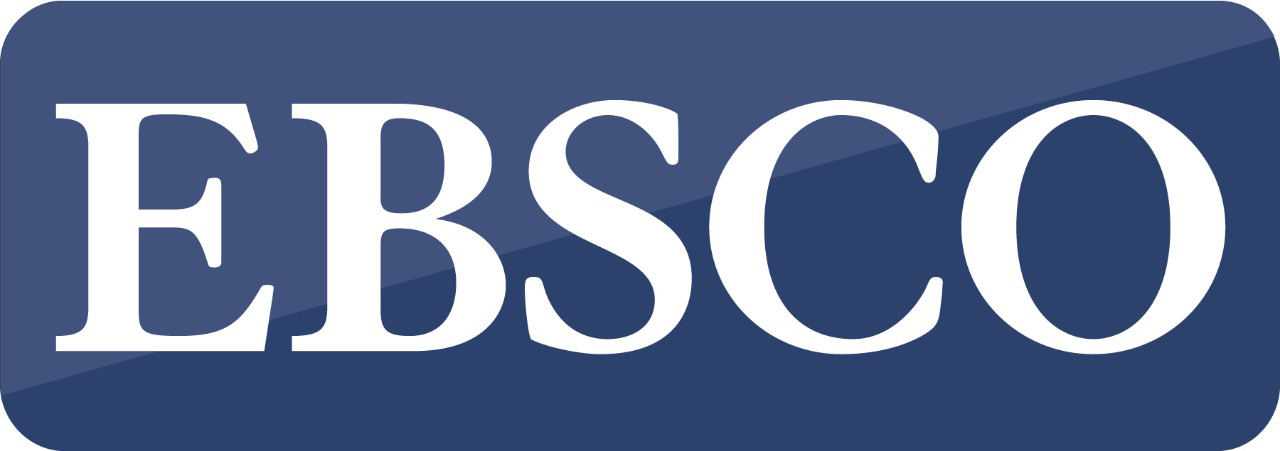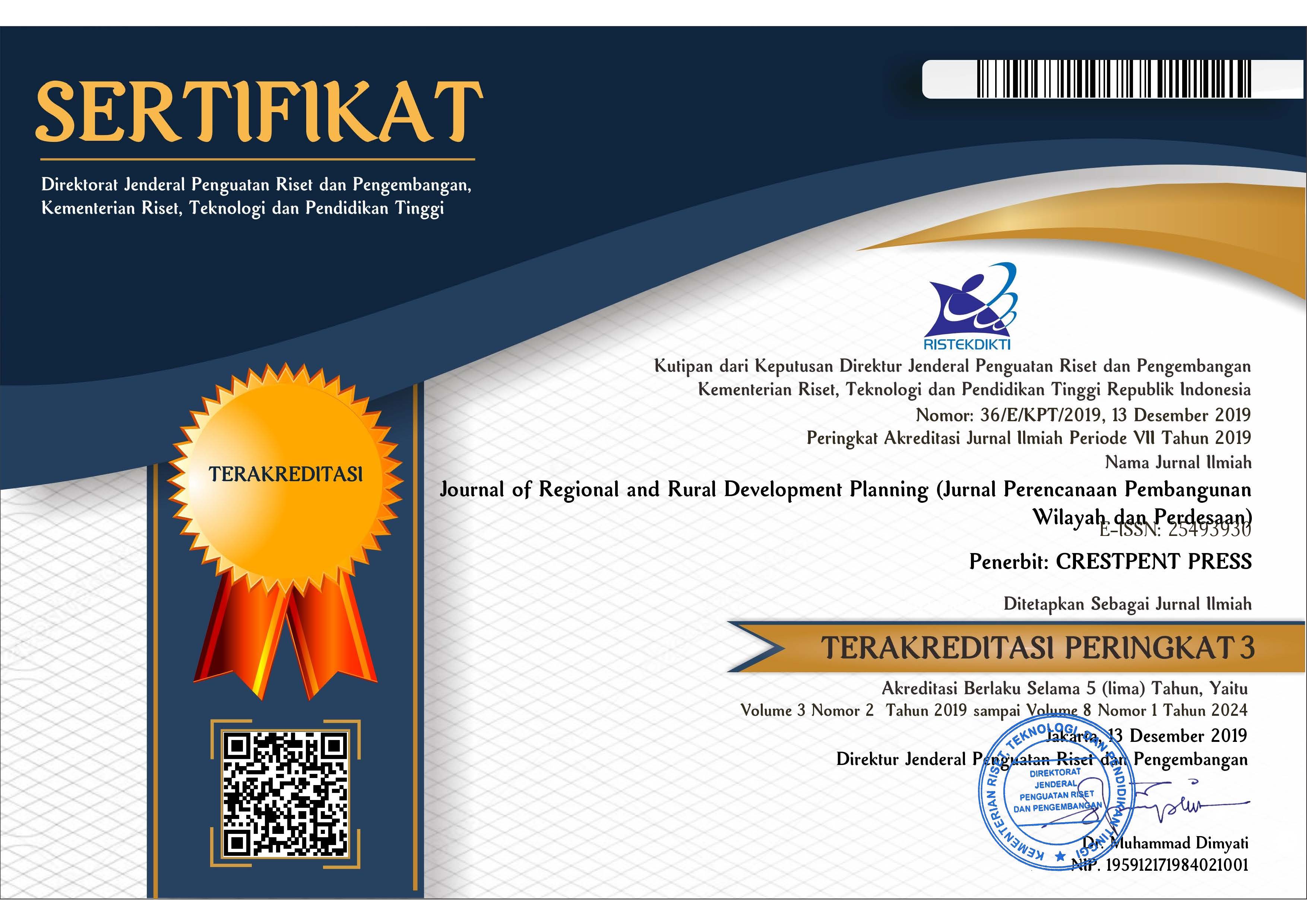Publication Ethics
Background
Journal of Regional and Rural Development Planning (JP2WD) is a peer-reviewed journal published by Crestpent Press. Journal of Regional and Rural Development Planning (JP2WD) shall ensure that all published works within the journal follow ethical principles on academic publishing. It is therefore essential to set an ethical standard for all parties involved in the act of publishing in order to create a conducive environment and to avoid problems that may arise due to a certain conflict of interest.
This statement clarifies ethical behavior of all parties involved in the act of publishing an article in this journal, including the author, the chief editor, the editorial board, executive and technical editors, reviewers and the publisher. This statement is based on COPE’s Best Practice Guidelines for Journal Editors.
Publication and Reproduction
The publication of an article in a peer-reviewed Journal of Regional and Rural Development Planning (JP2WD) is an essential building block in the development of a coherent and respected network of knowledge. It is a direct reflection of the quality of the work of the authors and the institutions that support them. Peer-reviewed articles support and embody the scientific method. It is therefore important to agree upon standards of expected ethical behavior for all parties involved in the act of publishing: the author, the chief editor, the editorial board, executive and technical editors, the reviewers, the publisher and the society.
Crestpent Press as the publisher of Journal of Regional and Rural Development Planning (JP2WD) takes its duties of guardianship over all stages of publishing extremely seriously and we recognize our ethical and other responsibilities. We are committed to ensuring that advertising, reprint or other commercial revenue has no impact or influence on editorial decisions. In addition, Crestpent Press and Editorial Board will assist in communications with other journals and/or publishers where this is useful and necessary.
Policies and Development
The chief editor is responsible for defining the objectives, focus and scope, maintaining the quality standard, and designing review, editorial and publication policies. The chief editor may seek advices from members of the editorial board in building the vision, deciding on long-term strategic issues, and leading the development of Journal of Regional and Rural Development Planning (JP2WD).
Decisions
The chief editor together with executive editors of the Journal of Regional and Rural Development Planning (JP2WD) is responsible for deciding which of the articles submitted to the journal should be published. The validation of the work in question and its importance to researchers and readers must always drive such decisions. The chief editor and executive editors are guided by the policies of the journal's editorial board and constrained by legal requirements as shall then be in force regarding libel, copyright infringement and plagiarism. The chief editor and executive editors may confer with reviewers in making this decision.
Fair play
Authors, reviewers and editors should maintain academic integrity during the whole process of publication. Business needs should be precluded from compromising intellectual and ethical standards. Manuscripts shall be evaluated for their intellectual content without regard to race, gender, sexual orientation, religious belief, ethnic origin, citizenship, institution, academic background or political philosophy of the authors.
Confidentiality
The editor and any editorial staff must not disclose any information about a submitted manuscript to anyone other than the corresponding author, reviewers, potential reviewers, other editorial advisers, and the publisher, as appropriate.
Disclosure and Conflicts of Interest
Unpublished materials disclosed in a submitted manuscript must not be used in an editor's own research without the express written consent of the author.
Duties of Reviewers
Contribution
Reviewers are requested to assist in improving the quality of the manuscript through a blind peer-review process within a scheduled period of time, and to contribute to the decision-making process on the manuscript.
Promptness
Any selected reviewer who feels unqualified to review the manuscript or knows that its prompt review will be impossible should notify the executive editor and excuse himself from the review process.
Confidentiality
Any manuscripts received for review must be treated as confidential documents. They must not be shown to or discussed with others except as authorized by the editor.
Standards of Objectivity
Reviews should be conducted objectively. Personal criticism of the author is inappropriate. Reviewers should express their views clearly with supporting arguments.
Acknowledgement of Sources
Reviewers should identify relevant published work that has not been cited by the authors. Any statement that an observation, derivation, or argument had been previously reported should be accompanied by relevant citation. A reviewer should also call to the editor's attention any substantial similarity or overlap between the manuscript under consideration and any other published paper of which they have personal knowledge.
Disclosure and Conflict of Interest
Privileged information or ideas obtained through peer review must be kept confidential and not used for personal advantage. Reviewers should not consider manuscripts in which they have conflicts of interest resulting from competitive, collaborative, or other relationships or connections with any of the authors, companies, or institutions connected to the papers.
Duties of Editors
Editors have the complete responsibility and authority to accept or reject an article. They should have no conflict of interest with regard to articles they accept or reject. Editors should be objective and fair in conducting their duties without regard to race, gender, sexual orientation, religious belief, ethnic origin, citizenship, institution, academic background or political philosophy of the authors. Editors should also accept manuscripts on the basis of academic merit and without commercial influence. Anonymity of reviewers should be preserved by editors.
Duties of Authors
Reporting Standards
An author should present an accurate account of the work performed as well as an objective discussion of its significance. Underlying data should be represented accurately in the paper. A paper should contain sufficient detail and references to permit others to replicate the work. Fraudulent or knowingly inaccurate statements constitute unethical behavior and are unacceptable.
Originality and Plagiarism
An author should ensure that they have written entirely original works. If the author has used the work and/or words of others, it shall be appropriately cited or quoted.
Peer-review Process
Authors are obliged to follow the peer-review process set by Journal of Regional and Rural Development Planning (JP2WD) and improve their manuscript considering review results and inputs from reviewers and executive editor.
Multiple, Redundant or Concurrent Publication
An author should not in general publish manuscripts describing essentially the same research in more than one journal or primary publication. Submitting the same manuscript to more than one journal concurrently constitutes unethical publishing behavior and is unacceptable.
Acknowledgement of Sources
Proper acknowledgment of the work of others must always be given. Authors should cite publications that have been influential in determining the nature of the reported work.
Authorship of the Paper
All persons listed as authors should qualify for authorship. Such authorship should be limited to persons who have contributed significantly to the conception, design, execution, data acquisition, data analysis or interpretation of the reported study. All those who have made significant contributions should be listed as co-authors. Where there are others who have participated in certain substantive aspects of the research project, they should be acknowledged or listed as contributors.
The corresponding author, on behalf of all author and co-authors, should submit a form (Form A) ensure that all appropriate co-authors and no inappropriate co-authors are included on the paper, and that all co-authors have seen and approved the final version of the paper and have agreed to its submission for publication. Request to add or remove author(s) or to arrange the author names of the accepted manuscript before it is published, must be sent to Chief Editor.
Disclosure and Conflicts of Interest
All authors should disclose in their manuscript any financial or other substantive conflict of interest that might be construed to influence the results or interpretation of their manuscript. All sources of financial support for the project should be disclosed.
Fundamental Errors in Published Works
When an author discovers a significant error or inaccuracy in his/her own published work, it is the author’s obligation to promptly notify the journal editor or publisher and cooperate with the editor to retract or correct the paper.
Editors and Authors could refer to International Standards for Editors and Authors (http://publicationethics.org/international-standards-editors-and-authors) by COPE (Committee on Publication Ethics) for policies that are not stated in this instructions.

















.png)




